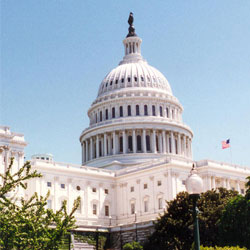 In anticipation of a serious update to the disco-era Toxic Substances Control Act (TSCA), Congress today began hearing expert testimony on which of the many toxic chemicals currently in circulation should be reviewed first. When Congress succeeds in moving forward with serious reform, the Environmental Protection Agency (EPA) will need to evaluate tens of thousands of chemicals already in widespread use. Those of you who have been following the issue know that, since 1976, the EPA has only examined 200 and prohibited five of the roughly 80,000 chemicals in commercial use today. In other words, the EPA faces serious backlog.
In anticipation of a serious update to the disco-era Toxic Substances Control Act (TSCA), Congress today began hearing expert testimony on which of the many toxic chemicals currently in circulation should be reviewed first. When Congress succeeds in moving forward with serious reform, the Environmental Protection Agency (EPA) will need to evaluate tens of thousands of chemicals already in widespread use. Those of you who have been following the issue know that, since 1976, the EPA has only examined 200 and prohibited five of the roughly 80,000 chemicals in commercial use today. In other words, the EPA faces serious backlog.
In his testimony today, Daryl Ditz of the Center for International Environmental Law offered Congress some advice on how to proceed:
“I strongly agree that the United States must set priorities in order to safely manage chemicals. But beware of any proposal that would give thousands of chemicals a free pass.”
“Here are three recommendations. First, EPA needs authority to promptly regulate the ‘worst of the worst’ chemicals. Second, EPA should evaluate all chemicals against a health-based standard. Third, Congress should require chemical manufacturers to provide all necessary information on their chemicals.”
“The Toxic Substances Control Act (TSCA) of 1976 has failed to assess, let alone guarantee, the safety of the great majority of chemicals. TSCA stymies action by EPA and other agencies, perpetuates a reliance on dangerous substances, leaves businesses in the dark, and undermines U.S. competitiveness.”
Listen to live audio broadcast of the hearings
So, which are the worst of the worst? These four tend to rise to the top of the list:
Greenwire ran a story yesterday providing some context and analysis from our campaign director, Andy Igrejas:
Momentum has been building in recent months to reform TSCA, with chemical manufacturers, environmental and public health advocates, environmental justice leaders and consumer product goods companies discussing ways to modernize the law…
Igrejas credits a shift in state policy and in the marketplace for the momentum. Several states have implemented policies governing chemical management, leading to differing policies around the country — a fact that the chemical industry also acknowledges was a major driver…
Igrejas said consumers have also played a significant role by demanding products free of some of the most controversial chemicals, which has led some retailers and manufacturers to announce they would no longer sell products containing certain chemicals.
“That really makes the question shift to not ‘if’ but ‘what,'” Igrejas said. “This has had a big impact on a variety of people on the Hill. There’s an emerging confidence that this is an area where progress can actually be made.”
Stay tuned for more updates on Congress, and for simple actions everyone can take to keep the momentum going. For more background on today’s hearings read our press release.
Those providing testimony were:
- Stephen Owens, assistant administrator at EPA’s Office of Pollution, Pesticides, and Toxic Substances
- Eric Sampson, director of the Division of Laboratory Sciences, National Center for Environmental Health
- Daryl Ditz, Ph.D., Senior Policy Advisor at the Center for International Environmental Law (a member of the Safer Chemicals, Healthy Families coalition)
- William Greggs, consultant for the Consumer Specialty Products Association, the Grocery Manufacturers Association, and the Soap and Detergent Association
- Beth Bosley, consultant for the Society of Chemical Manufacturers and Affiliates.



